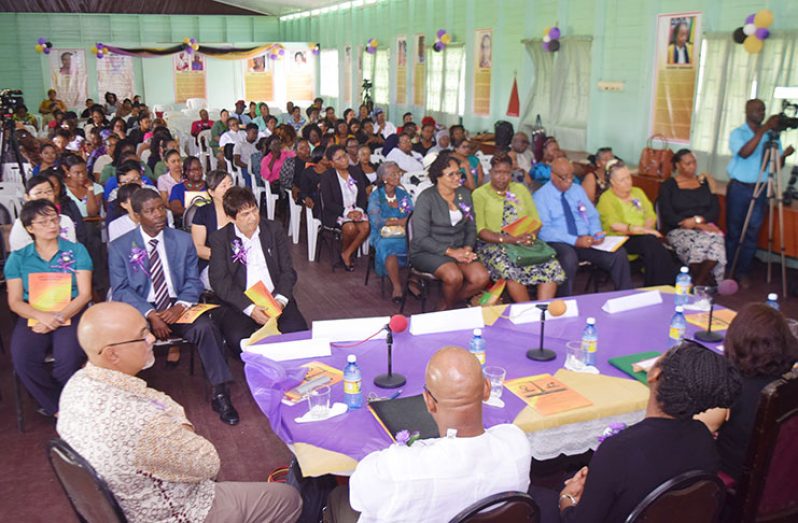…women urged at Roundtable discourse
By Zena Henry
THE United Nations has themed the 2017 International Women’s Day occasion, “Women in the Changing World of Work: Planet 50-50 by 2030.” The organisation has charged the relevant agencies in its member countries to attain gender parity within a set time span.
The Women, Gender and Equality Commission (WGEC) is among several agencies here in Guyana that will take up the enormous task of assisting in the attainment of gender parity by 2030. During an informative Round Table discussion at Carifesta Sports Complex on Tuesday, it was reiterated that several issues remain unaddressed and will thus hinder efforts toward this achievement.
Deputy Vice-Chancellor, Planning and International Engagement at the University of Guyana, Dr. Barbara Reynolds, in her presentation to a gathering that included First Lady Sandra Granger, government ministers, Non-governmental organisations and mostly civil service women, insisted that among the many things to be done in attaining gender parity by 2030, women will have to revitalise the bond of sisterhood, while encouraging the growth of men-folk in the process.
Reynolds pointed to several statistics that show a trending decline in the advancement of men. She pointed to schools and institutions, using the University of Guyana where women are being more successful that men and are attaining tertiary education in larger numbers than their male counterparts. While this may be positive news for the advancement of women, Dr. Reynolds believes this is a negative sign. “The last thing that we want is 50 percent of the population with their muscle and testosterone, their frustrations, their aggressions uneducated.” She said it was one thing when girls and women were not allowed to be educated, but to allow the growing trend of uneducated boys and men may prove more detrimental. “We need to get our men and boys into schools,” she insisted, “they need to be educated, education is humanising, it is the best socialising factor that we have.”
On the other hand, the question was asked, “What has happened to the sisterhood.” Reynolds said that women are still found tearing down and fighting each other. “Lets us wake up and revive the sisterhood. We have race issues, class issues, and all that divides us… but fundamentally we can be sisters together.” Dr. Reynolds pointed to the genuine relationship between women that will enable them to function for their general benefit.
She called on women to also do what she described as “unpacking”. She urged that when women find themselves in a situation they need to “unpack” the issues and factors for a better understanding of their predicament. For example, Reynolds pointed to the increase of women in the security sector because of the shift of men to higher paying jobs. In that vein she opined that in everything done, an understanding of how it affects both men and women must be sought.
Another presenter, Chairman of the Justice and Peace Commission of the Roman Catholic Church in Guyana, Lawrence Latchmansingh, from a man’s perspective, highlighted numerous ways in which women are being objectified by men, the media and several other regimes for profit. He provided statistics that showed that a large percent of Guyanese support violence against women based on what she would have done wrong; whether she had been unfaithful or failed to do house chores. He also pointed out how under- represented women are in the local political arena after providing telling figures out of the local parties.
Honour was brought to the two new females now heading the judiciary system. However a picture highlighting a room filled with men choosing who fill those vacancies, got loud gasps from the gathering.
One of Latchmansingh’s recommendations in attaining gender parity was the development of a platform to actively defend women against objectification and men who are determined to hold on to power over women.
First Lady Sandra Granger congratulated all women on their contributions to society. As one against human trafficking, and an advocate for the education of young girls and women, and maternal advancement, are some of the areas the First Lady would like to see addressed. “I believe that with behavioural change, determination and serious concerted action we can become a healthier, more educated, more confident and productive society. We can then achieve gender parity in not too distant future,” the First Lady said. She added that women need to recognise and address the social and economic factors limiting easy access to education for the development of women and girls in Guyana.
Mrs. Granger said that in order for gender parity to become a reality several steps are required. “Our entire population must be educated to understand the long-term implications of gender disparity. We must be bold for change. We must speak up and speak out against injustice. A comprehensive country-wide campaign should be launched to socialise our women and men, girls and boys, so that they recognise and desist from behaviours, which harm us individually, collectively, socially and economically,” Mrs. Granger said.



.jpg)









